|
|
|
Sort Order |
|
|
|
Items / Page
|
|
|
|
|
|
|
| Srl | Item |
| 1 |
ID:
118951
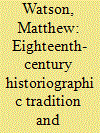

|
|
|
|
|
| Publication |
2013.
|
| Summary/Abstract |
This article focuses on Adam Smith's largely sympathetic response to the Rousseauian critique of the moral degeneracy of modern 'economic man'. It thus emphasises his philosophical ambivalence towards commercial society over the textbook IPE presentations which ascribe to him an almost wholly unreflexive market advocacy. In doing so it provides important methodological lessons for the study of Everyday IPE today. Arnaldo Momigliano has identified a decisive break in historical method in the eighteenth century, of which Smith and Rousseau were key exponents. However unwittingly, contemporary Everyday IPE scholars are the spiritual heirs of the eighteenth-century move from writing public histories of the state to writing private histories of unnamed individuals who embody the most recent phase of human sociability. The eighteenth-century economic man was conceptualised in relation to evolving forms of economic organisation, where the economy in turn was thought to reflect the prevailing system of 'manners'. Smith united with Rousseau in the belief that their society's bourgeois politeness allowed materialist ideologies to corrupt the moral autonomy of the individual. The historical method underpinning such concerns also allows Everyday IPE scholars to ground similarly-styled attempts to understand threats to moral autonomy arising from the struggle over economic surplus today.
|
|
|
|
|
|
|
|
|
|
|
|
|
|
|
|
| 2 |
ID:
118958
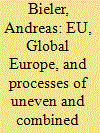

|
|
|
|
|
| Publication |
2013.
|
| Summary/Abstract |
In 2006, the European Union launched its new free trade strategy Global Europe with the explicit goal of increasing European competitiveness. This article explores the positions of trade unions and other social movements on Global Europe. Importantly, while Northern social movements and trade unions from the Global South reject Global Europe due to its impact of deindustrialisation on developing countries, European trade unions support it in so far as it opens up new markets for the export of European manufactured goods. It will be argued that this has to be understood against the background of the dynamics underlying the global economy and here in particular uneven and combined development. Due to the uneven integration of different parts of the world into the global economy, workers in developed countries may actually benefit from free trade, while workers in the Global South are more likely to lose out. It will, however, also be argued that while these different positions within the social relations of production are shaping the position of trade unions, they do not determine them. Over time, through direct engagement, trade unions in the North and South may be able to establish relations of transnational solidarity.
|
|
|
|
|
|
|
|
|
|
|
|
|
|
|
|
| 3 |
ID:
118960


|
|
|
|
|
| Publication |
2013.
|
| Summary/Abstract |
Why have non-Western powers, such as China, pursued a grand strategy of commercial integration into the liberal system? In developing a general theory of competitive pressure, this article builds upon a growing body of literature that seeks to develop a liberal systemic theory. Powerful network externalities - system-level pressures and incentives - have emerged as a by-product of the highly integrated liberal core. Outsiders have been moved by an interest in accessing these network benefits as well as a fear of falling behind in the struggle for relative power. In a plausibility probe, the article explores China's decision to join the world.
|
|
|
|
|
|
|
|
|
|
|
|
|
|
|
|
| 4 |
ID:
118952
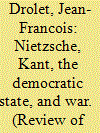

|
|
|
|
|
| Publication |
2013.
|
| Summary/Abstract |
This article offers a reconstruction of Nietzsche's critique of Kant's scheme for perpetual peace distilled from his life-long confrontation with Kant's critical philosophy. Through this reading strategy, it sheds light on Nietzsche's controversial and yet surprisingly under-researched reflections on the problem of conflict and war in human affairs. Although Nietzsche embraced many of the basic premises of Kant's critical philosophical project, he considered the ethico-political conclusions Kant drew from these to be both irrational and nihilistic. From Nietzsche's perspective, Kant's thoughts on politics and International Relations rest on a fundamental misunderstanding of the phenomena of agency, statehood, and war that elides both the tragic relationship between politics and culture, and the violence which Nietzsche believes to be latent in all attempts at reconciling individual with collective autonomy. According to Nietzsche, Kant's influential association between liberal republicanism, freedom, and peace contributed unwittingly in ushering in the cult of the nation-state, which Nietzsche warned would engulf Europe into a wholly new kind of organised violence in the coming decades. Although clearly not without their uncritical assumptions and hubristic tendencies, Nietzsche's reflections on war and peace draw attention to some of the more insidious risks and difficulties attending liberal attempts at accommodating cosmopolitan values and principles within the framework of the modern nation state.
|
|
|
|
|
|
|
|
|
|
|
|
|
|
|
|
| 5 |
ID:
118954
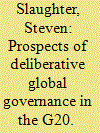

|
|
|
|
|
| Publication |
2013.
|
| Summary/Abstract |
This article contends that the 'G' system struggles to play a legitimate and effective role in global governance and argues that the G20 could play a important role if the forum was more publically accountable. This article argues that because of increasing forms of public contestation, the broadening agenda of the G8 and G20 and the uncertain status of global cooperation, that the legitimacy of the 'G' system is being questioned. As such, it is appropriate to consider deliberative avenues whereby public views could be considered by the G20 in a systematic way to foster forms of accountability. This consideration is animated by deliberative democracy theory and republican theory which advance a normative agenda which seeks to transform governance structures by enhancing the role of deliberation and public reasoning in political life. The article outlines the development of the 'G' system's legitimacy, considers possible modes of accountability and public involvement with respect to the G20 and examines the implications of more formalised public deliberation with respect to the G20.
|
|
|
|
|
|
|
|
|
|
|
|
|
|
|
|
| 6 |
ID:
118955


|
|
|
|
|
| Publication |
2013.
|
| Summary/Abstract |
Contemporary peacebuilding operations are often mandated to rebuild 'collapsed' or weak states and provide unique opportunities for internationals to exert far reaching influence in their reconstruction. The responsibility to help secure peaceful transformations and longer term stability is profound. This article explores the issue of efficacy and propriety in reconstruction programming and draws from field work in Sierra Leone - a rare example of 'success' for international partners in peacebuilding missions. The assertion is made that, despite the euphoria over the mission in Sierra Leone, the peacebuilding operations were more about the mechanics of statebuilding than the local politics of building peace, and that there was a distinct disconnect between the policy rhetoric and the policy practice. The argument is put that the pressing local concern of giving citizens a stake in government was not best served in the reconstruction project because the wider and more influential objectives of the peacebuilding mission were about meeting international goals not local aspirations. This reality has come at the cost of exploiting a unique opportunity for creative thinking about the kind of state structures which can better address the main challenges for sustainable peace facing post-war states like Sierra Leone.
|
|
|
|
|
|
|
|
|
|
|
|
|
|
|
|
| 7 |
ID:
118957


|
|
|
|
|
| Publication |
2013.
|
| Summary/Abstract |
The concept of epistemic communities - professional networks with authoritative and policy-relevant expertise - is well-known thanks to a 1992 special issue of International Organization. Over the past twenty years, the idea has gained some traction in International Relations scholarship, but has not evolved much beyond its original conceptualisation. Much of the research on epistemic communities has been limited to single case studies in articles, rather than broader comparative works, and has focused narrowly on groups of scientists. As a result, it is often assumed, erroneously, that epistemic communities are only comprised of scientists, and that the utility of the concept for understanding International Relations is quite narrow. Consequently, an otherwise promising approach to transnational networks has become somewhat marginalised over the years. This article revisits the concept of epistemic communities twenty years later and proposes specific innovations to the framework. In an increasingly globalising world, transnational actors are becoming progressively more numerous and influential. Epistemic communities are certainly at the forefront of these trends, and a better understanding of how they form and operate can give us a clear demonstration of how knowledge translates into power.
|
|
|
|
|
|
|
|
|
|
|
|
|
|
|
|
| 8 |
ID:
118956
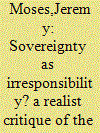

|
|
|
|
|
| Publication |
2013.
|
| Summary/Abstract |
This article aims to cast a critical light on the concept of 'sovereignty as responsibility', which lies at the heart of the Responsibility to Protect (RtoP). It argues that there are two distinct strands of theorising about sovereignty, de facto and de jure, which are not often clearly distinguished in the literature. After establishing the concept of 'sovereignty as responsibility' as a de jure theory of sovereignty, the article goes on to contrast the de facto theory, based upon the sovereignty theories of Hobbes, Schmitt, and Morgenthau. I argue that the de facto theories of sovereignty, concerned as they are with unlimited power and decision as the essence of sovereign authority, can be used to highlight the lack of appreciation of power in the literature surrounding the Responsibility to Protect. This is particularly the case in relation to the just war principles of 'right authority' and 'reasonable prospects of success', both of which lie at the heart of the RtoP criteria for assessing when military interventions for human protection purposes may take place. In conclusion, it is argued that any attempt to advance the RtoP norm must engage with the problem of unlimited power in a more sustained manner.
|
|
|
|
|
|
|
|
|
|
|
|
|
|
|
|
| 9 |
ID:
118959


|
|
|
|
|
| Publication |
2013.
|
| Summary/Abstract |
Scholars of the societal security dilemma implicitly or explicitly aim to analyse actor responsibility in intersocietal group confrontations. However, adherence of these approaches to (neo-)realist theoretical assumptions of the security dilemma hinders this objective. This article provides analytical principles upon which a new societal security dilemma can be constructed in order to conduct a more comprehensive analysis of actor responsibility. A new societal security dilemma framework can be built upon three principles: (1) a security dilemma results in violence depending on how the actors themselves interpret the political structure in which they interact with others; (2) differentiation of actors' intentions as malign or benign is inconsequential; what matters is how actors interpret security and which tools they choose to adopt to achieve security; and (3) identity is not exogenous to the politics of security. Adopting these principles requires reconceptualisation of the security dilemma. It will be argued that a new societal security, which reflects the politics of security, can provide a more comprehensive, dynamic, political, and realistic analysis of actor responsibility in societal-level confrontations. These new principles will be illustrated through re-reading of the dissolution of Yugoslavia to analyse actor responsibility as a sketch of the new societal security dilemma theorising.
|
|
|
|
|
|
|
|
|
|
|
|
|
|
|
|
| 10 |
ID:
118953
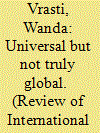

|
|
|
|
|
| Publication |
2013.
|
| Summary/Abstract |
This article responds to issues raised about global governmentality studies by Jan Selby, Jonathan Joseph, and David Chandler, especially regarding the implications of 'scaling up' a concept originally designed to describe the politics of advanced liberal societies to the international realm. In response to these charges, I argue that critics have failed to take full stock of Foucault's contribution to the study of global liberalism, which owes more to economic than political liberalism. Taking Foucault's economic liberalism seriously, that is, shifting the focus from questions of natural rights, legitimate rule, and territorial security to matters of government, population management, and human betterment reveals how liberalism operates as a universal, albeit not yet global, measure of truth, best illustrated by the workings of global capital. While a lot more translation work (both empirical and conceptual) is needed before governmentality can be convincingly extended to global politics, Foucauldian approaches promise to add a historically rich and empirically grounded dimension to IR scholarship that should not be hampered by disciplinary admonitions.
|
|
|
|
|
|
|
|
|
|
|
|
|
|
|
|
|
|
|
|
|